- Home
- Barry Unsworth
The Hide Page 6
The Hide Read online
Page 6
I never seen the house till the last minute. I come round a bend in the drive and there it was, lawn on the left, if you can call it a lawn, and then the house bang in front. Five steps up to what she calls the terrace. Door with a big brass knocker, no bell. And it turns out, only the two of them live in it, the brother and sister. Marion too, a course. That is a funny thing, I don’t think of Marion living in the house, not in the same way. She does not seem to take up much space like, maybe that’s it. She moves about the place but she don’t take up much room. She is a bit on the thin side. I like them thin. I can’t stand fat. Sometimes I am walking along behind a woman, I am looking at her legs, every time she puts her foot down her fat leg wobbles, that is disgusting in my opinion. Why don’t they go on a diet? Or there is massage. Men’s legs don’t do that. I know which is Marion’s bedroom.
I haven’t told Mortimer about Marion yet. I will have to sooner or later, a course, but I don’t feel like it just now. He will go on at me, soon as I tell him, specially since I did not mention it to begin with. Mortimer sees deep into things, he talks things over and a lot of stuff comes out that you never realised before. And what he comes out with might be bad for Marion. It might make me see her in a different light. I would rather have just my own idea of her for the time being. It is not doing anything against Mortimer, because I am going to tell him.
I like her. I like her being thin and her face, well she isn’t what you’d call pretty but she’s got nice eyes and a nice skin and she has got good tits even if she is thin, they showed up in that pink pullover like Jaffas, well tangerines, wonder how old she is, seventeen?
Only three of them in the house (two, I told Mortimer). Doesn’t seem right. What do they want with such a big house? That is exactly the question Mortimer asked when I told him. He always puts his finger on it. There are people living at this moment, at this very moment, he said, in compounds and camps, living in tents, kids born in tents, refugees. It makes you think, he said. Well, I agree, a course, it doesn’t seem right. In this day and age.
I went up on to the terrace and knocked at the door. I knocked and waited, knocked again. No one came. I didn’t hear no movements inside the house. Nothing at all. Well, it gave me a funny feeling, a big house like that. What I mean is, you’d expect people about. I might have turned round and gone back there and then. What if I’d of just turned round and walked away? There would of been no Marion. I looked back the way I came. You couldn’t see nothing much of the drive from there, only the big dusty bushes where the drive began and across the lawn more bushes and some trees, you couldn’t see nothing, just trees and leaves and everything quiet. No wind, nothing moving that you could see, but there was this feeling of movement inside it all, I dunno, a sort of swarming as you might say, but no noise with it and nothing you could see. I might of gone away there and then, I didn’t like it, but I knocked one more time and they opened the door. Marion did. Not that I knew her name then. I only found out her name this morning. Met her behind the house while I was getting out the scythe. Smiled at me, she did. White cotton dress on. Are you managing all right? she says. Teeth stick out a bit, buck teeth really, but I don’t mind them. Yes, I said. Yes, thank you very much. And then, before we can get talking, there is this sort of la-di-da scream from somewhere at the side of the house, Mario—o—on, where are yo—o—ou? So that is your name, I said. Yes, she says, what is yours? Josiah. That is an unusual name isn’t it? Then that screech again, Mario—o—on. I better go, she says. Funny girl with that dress, frizzy hair, big brown eyes. She don’t take enough trouble over her appearance. She don’t make the best of herself. She ought to grow her hair out to begin with and use a bit a make-up. One of these days I’ll tell her.
It’s wonderful really. I am sitting here now against this tree. Sun on my legs. Smell of the cut grass. Thinking about Marion and her funny smile and Mrs Wilcox all in blue. Pale-blue twin set and a dark-blue skirt. I notice colours, always have done.
She must like blue because the sofa and armchairs in the room where I waited were covered with little blue flowers like forget-me-nots or something of that sort, made a nice pattern, very artistic, and a low round table with a copper vase on it but nothing in the vase. Not enough colour in that room, nothing to draw the eye as you might say. I would of had something in a bit brighter myself, some gay cushion covers like, not that it wasn’t tasteful. I said to Mortimer, you have to have a centrepiece otherwise you don’t get no grouping, there wasn’t no centrepiece in that room. I like to show him I know something about décor. That is your province, Josiah, he said to me. I have always been interested in it. If I see one of them magazines lying about I always look at the pictures of interiors. I don’t bother with the words underneath, usually. We was always moving about when I was little. Reading is hard work for me as a matter a fact, but I never say nothing to him about that.
Only thing on her not blue was her necklace, that was pearls, but I dunno if they was real. I got up soon as she come through the door, all the time I was sitting there waiting I was reminding myself to do that when she come in. I know my manners. She was about the same height as me. Face very pale and small, with these straight eyebrows and a sharp straight nose. She looked pleased with herself. And this grey hair like. You have come from the Labour Exchange, have you? In a manner of speaking, I said. I was still thinking how peculiar the place was and how I come to be there. I wasn’t sure at that moment that the Labour had anything to do with it. That might sound funny, but there it is. She opened her eyes a bit. Bossy eyes. What on earth does that mean? she says. Very la-di-da, a course. A man either comes from a Labour Exchange or he doesn’t, she says. I saw the red light right there. Yes, I said. They sent me. You look very young, she says. Have you had experience of gardening? Well, I said, I done a bit, I said, but I understood it was odd jobs. Then she asked me how old I was. She should not of done, Mortimer said. She should not of asked that. It lay outside her province, Mortimer said. Positively feudal, he said, and I am giving his own words now. It is a wonder, he said, she didn’t prise your jaw open and have a dekko at your molars. No, quite unacceptable, he said. It is from that moment that I date his taking against Mrs Wilcox. He wouldn’t hear nothing good of her after that. You have got no pride, Josiah, he said, but it didn’t mean nothing to me. I am twenty, I said. Then there was a bit of a silence and I looked at her face. She has the sort of face you can’t tell if she is smiling or not. It is very young, she says. In time, I says, I’ll be older. Quick, just like that, I come out with it. It was one of the first things I told Mortimer, how I come out with that, but he didn’t seem to think much of it. I thought he would of laughed. I never understand what makes Mortimer laugh, he’s got a sense of humour all of his own. He laughed when I told him how I stood up when she first come in, he laughed at that, I dunno why, he don’t like to share a joke. You can ask him, he won’t tell you, just go on laughing. I could not do that, myself. When he laughs his lower lip draws right back showing the bottom gums, his eyes close nearly. Mortimer does not usually make any noise when he laughs.
Wish she was here now. Marion I mean, not Mrs Wilcox, Christ. Sitting here beside me on the grass. Just talking like, not doing nothing. Or maybe she lies down on her back, moves her legs a bit just by accident like. She’s showing her legs but she don’t know it. She has got her eyes closed all the time. I can see right up her legs but she don’t know it. No, wait a bit, she knows it all the time like, but she don’t let on, she is doing it on purpose. I put my hand up her skirt and she still keeps her eyes closed. . . .
Simon . . .
STRAIGHTENING MYSELF I look once more across the quiet green field at the bungalow: nothing moves there except three white hens at the side. My binoculars rest ready focused in their niche in the hedge. Today is Monday, washing day. I never willingly miss a washing day at the bungalow, mainly because of the few minutes while she is hanging out the clothes—a time when sops to decorum are often not paid. For instance her hair ma
y well be escaping from the insufficient pins, her skirt unzipped showing a gaudier seam. She is a woman of generous proportions, and in the warmth and steam and exertion of washing, those proportions are more likely to escape confinement. I have known her large breasts swing untrammelled, beneath a flimsy blouse. Once I got her against the sun, not apparently wearing anything under a cotton skirt. (On that occasion I became over excited and vomited.) She is a careless woman, I thank God.
This morning, however, I cannot enjoy my usual feelings of anticipation. I am troubled by the gardener’s presence in the grounds and by Audrey’s vindictiveness towards me which shows no sign of lessening. (Only yesterday evening she asked me, when we met on the stairs, whether I had yet found somewhere else to live.) And with such composure, such absence of heat: I don’t think I showed her my fear however. I know all the time I am standing here that there is something I positively must do this morning, a job that takes priority over everything else and that is I must erase all signs of the tributary tunnel I was rash enough to begin last week. Absurd to think I should be able to do any tunnelling with that gardener about. He is here now, today, he is round at the side of the house, weeding between the flags of the paved courtyard that Audrey says she wants to turn into a patio. A word she would not have used before joining the Dramatic Society. All last week, under her direction, he was cutting the lawn, rooting up the dock and dandelion, getting things ready for the garden party which will be held in the grounds with the object of raising funds for the Dramatic Society. Audrey herself has been very energetic since the gardener started work here, getting up at eight and walking round the place in corduroy trousers. . . . The weeding should take him all morning but one never knows when he might start poking about in the shrubbery, come upon a half-dug trench, the earth still raw, follow it up, discover the main tunnel, the whole thing. All my work . . . I couldn’t allow that to happen. I must fill it in again, cover all traces. Then I shall have time to watch, safeguard myself, form a plan. . . .
Still, however, undecided, I look beyond the bungalow at the green wheat. About a foot high now, quite still today. I remember the field ploughed black in the windy days of March and the lapwings overhead and the way they seemed to die in the air. Sweep down on the wind, check, somehow, for a second, fold their wings and drop like a stone, then at the last moment, recover, beat upwards, uttering always at the point of recovery a distraught cry of joy, that’s the only word for it, this abandonment must be happiness in the bird, what else? Strange that this intensest moment should bear for the human observer a resemblance to death. . . .
I remember the tall gold wheat of August stiff as brocade in the windless air in the fields along the river bank. We walked along the river bank, the three of us, till we reached the big meander; wheat and larks and poppies. Deep still water, a little shingled border on the near side. We changed very modestly behind bushes and then we swam and afterwards lay down on the shingle, Audrey’s friend in the middle. It was such a hot day. A boy’s costume, high in the body but narrow fronted and with narrow shoulder straps, I can remember every detail of that costume now after all these years, the exact width of the straps is reproduced in my mind, and the high front going up almost to the neck but very narrow. Perhaps it was her brother’s. Wrinkling as it dried and loosening from her body. She was a very thin girl, painfully thin as they say, and whiteskinned, very white she looked in that black bathing suit which had been designed for a boy, and which in drying wrinkled back, loosened, and revealed her left breast to me. The sun on my eyelids and a skein of light between eyes and lids. Hot shingle, texture of the pebbles, heat flowing over me, all seeming now like heralding sensations, a light massage of the senses—preliminary to the moment when, in a sun stupor, turning my head and half opening my eyes, I saw at a distance of some eighteen inches with a sort of nimbussed radiance, the nude slope of my sister’s friend’s left breast up to and decidedly including the nipple. The temporary and provisional nature of the vision was what impressed me first, the need for a devoted stillness on my part. Even my breathing I stilled, staring closely at the slightly freckled white skin of the slope which rose to the first isolated pimples, freckles as it were in relief, milk-chocolate brown in colour; the nipple itself not quite perfect in shape and irregular in texture, the colour of a healing bruise, the tip redder with its suffusion of blood. A tender little dip, a declivity, at the very peak, as if the nipple, urged up by some gentle insistence of the blood, or raised from the malleable teat by some divine inhalation, had then subsided, ever so slightly caved in. My sister’s friend’s nipple had thus the look of perfection slightly marred.
A cool breeze blew over the water and I watched the flesh round the nipple pimple more prominently, the roseate corrugations become more sharply defined. She did not know, of course, either that the breeze had produced these changes in the appearance of her left breast or that I was busily and, in spite of my excitement, competently recording them; and this serenity of her ignorance was maintained beyond my endurance, caused me finally to turn from her on to my other side, knees drawn up and body arched, foetal in convulsions. No one can understand who has not experienced it how almost overwhelming such throes can be when induced by the intensities of sight alone, how the whole being is flooded, almost borne away. . . . And when I opened my eyes again there was the staring wheat. . . .
Still nothing happening at the bungalow. I can wait no longer, that trench must be attended to. I begin to make my way through the grounds. It is a beautiful morning, earlier it rained a little and now there is what seems a delicate transparent sheath over everything. Somewhere on my left a blackbird is singing. I skirt the pond which with the advent of summer has become distinctly malodorous, hearing as I do so three plops of frogs. A little beyond this I enter the area of shrubbery and go directly to my so recently begun trench. The only safe way, as I see immediately, is to fill it up with earth again and cover it over with grass sods. But the earth will have to be brought back from the tip behind the house, a laborious business.
I stand for some moments confronting the need to begin work. I remind myself that it is a very urgent matter. Audrey might at any moment, striding about in her corduroy trousers, order the gardener to divest of vegetation Howard’s seat and trellis and arbour, not a dozen yards from where I stand. In that case discovery would be inevitable. At the moment these things are hardly recognisable. The rustic bench is so invaded by grass that it looks like some weirdly shaped boat trapped in weed. Beyond it Howard built a rose arbour and a trellised walk, training various creepers to grow over it, clematis and the like, and, of course, the cottage roses, which still multitudinously bloom. However, ruder plants have clambered for years unchecked over trellis and arbour, making of the whole a rather monstrous hump of accreted vegetation, closing both ends in a tangled mass of honeysuckle and bindweed and bryony so that only the smaller and more active quadrupeds could now gain admittance to the wooden table inside, over which poor Howard must have envisaged his fêtes champêtres.
Still deferring the job of filling up the trench I gaze fixedly at the roses, great sprays of them deep pink and sweetly scented, the petals rucked and folded and intricate. Their weight pulls the sprays down, very graceful and elegaic. I walk across with a sudden feeling of unhappiness, and pick one of the unopened roses. It is cool, very slightly moist. I open the bud, folding back the petals, which soften and become pliable immediately from the warmth of my fingers, betraying thus the degenerate stock. In the heart of the flower, the petals are almost white, with only the faintest of flushes. With surprise and disapproval I discern numbers of tiny gleaming beetles scurrying about. Even in the interior of a rose it seems, there is no inviolate space.
Suddenly, still holding the rose, I hear a swishing or hissing sound of very brief duration from somewhere in front of me in the area adjoining the road. It is repeated almost immediately and thereafter at intervals of about five seconds. An alien sound, quite distinct from all others in the grounds
, distinct precisely because I cannot identify it, it comes clear to my ears with the effect of a harsh, possibly minatory respiration; it would appear to be coming from the open area between the hedge and the shrubbery.
I move cautiously forward towards the sound. Passing from the cover of the trees into the shrubbery I am obliged at first to crouch and then to go on hands and knees. The sound grows steadily clearer, no longer like a breath, however harsh, but now with a composite sound as of many minute collisions. Then I see him, fifty or sixty yards away, standing in the open not far from the hedge, his body turning, hands held low, the scythe audibly slicing through the grass, nettle, buttercup, foxglove. The sun catches the long blade as it is drawn back, shreds of green adhere to it. He stands with head slightly lowered, his oiled curls shining in the sun as though listening carefully himself to the hiss of the blade. I note that he has taken off his jacket but not rolled up his sleeves which are long and cover part of his hands and this seems to me in its inappropriate elegance entirely characteristic of him.
It occurs to me that I could speak to him now. I could warn him for example to keep away from the robin’s nest, which has eggs in it. I could go back through the shrubbery to the drive then walk boldly up it and accost the gardener in confident loud tones. I could establish a relationship with the gardener. I do none of these things, however, and in fact the next moment the opportunity is gone because I hear steps on the drive to my right, quite close, not more than a dozen yards away, very light steps, otherwise I should have heard them before. Before I have time to do more than crouch a little lower, I see the upper part of Audrey passing down the drive, carrying a copper tray with tea things on it. On her face there is a strange expression, a look of tension which is not, however, unhappy, almost as though she is suppressing a desire to laugh, suppressing all evidence of the desire. On the tray I glimpse jug, bowl, teapot, even a plate of biscuits. She is wearing a pink mohair jumper, short-sleeved, which I had not known formed part of her wardrobe. It looks astoundingly frivolous.

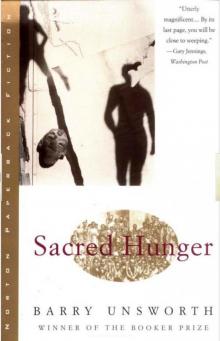 Sacred Hunger
Sacred Hunger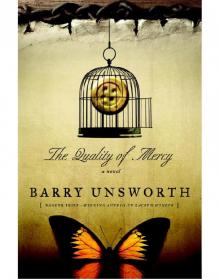 The Quality of Mercy: A Novel
The Quality of Mercy: A Novel The Songs of the Kings: A Novel
The Songs of the Kings: A Novel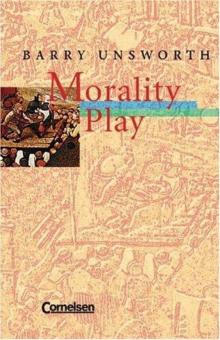 Morality Play. Mit Materialien. (Lernmaterialien)
Morality Play. Mit Materialien. (Lernmaterialien)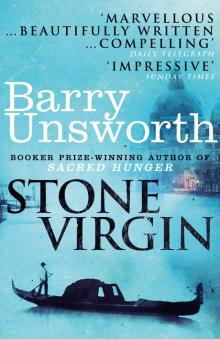 Stone Virgin
Stone Virgin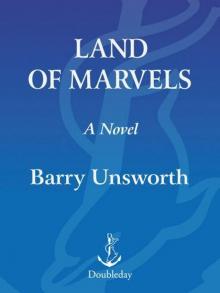 Land of Marvels
Land of Marvels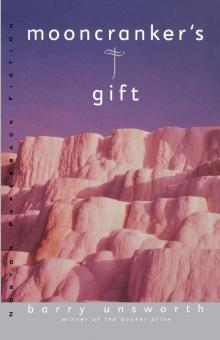 Mooncranker's Gift
Mooncranker's Gift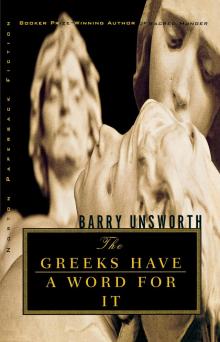 The Greeks Have a Word for It
The Greeks Have a Word for It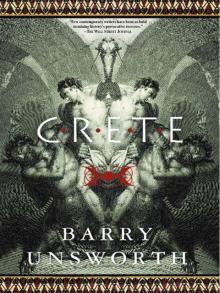 Crete
Crete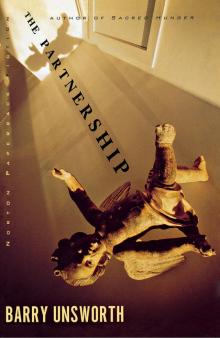 The Partnership
The Partnership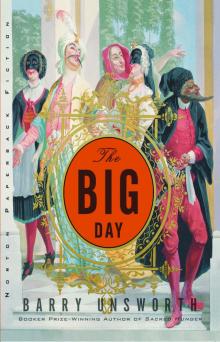 The Big Day
The Big Day The Hide
The Hide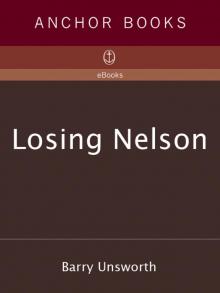 Losing Nelson
Losing Nelson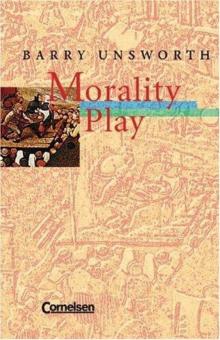 Morality Play
Morality Play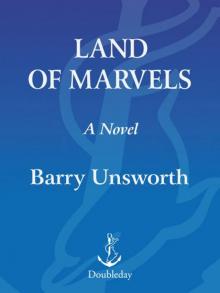 Land of Marvels: A Novel
Land of Marvels: A Novel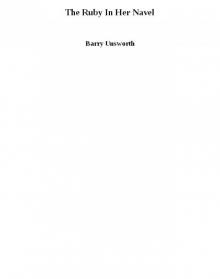 The Ruby In Her Navel
The Ruby In Her Navel